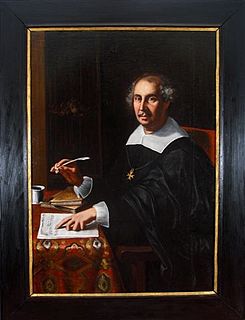External links
- Biography at answers.com
- Free scores by Bartolomeo Montalbano in the Choral Public Domain Library (ChoralWiki)
Bartolomeo Montalbano (c. 1598 - before 18 March 1651, Venice) was an Italian Baroque composer.
Montalbano was born in Bologna. After entering the Franciscan order, in 1619, he got his musical education there. From 1629, he worked as a Kapellmeister in Palermo and from 1642 until his death, he held the same position at the San Francesco in Bologna.
His sacred music has not survived, but his baroque symphonies for various orchestration, motets and a mass for four voices have been preserved.

Adriano Banchieri was an Italian composer, music theorist, organist and poet of the late Renaissance and early Baroque eras. He founded the Accademia dei Floridi in Bologna.
Andrea Gabrieli was an Italian composer and organist of the late Renaissance. The uncle of the somewhat more famous Giovanni Gabrieli, he was the first internationally renowned member of the Venetian School of composers, and was extremely influential in spreading the Venetian style in Italy as well as in Germany.

Giacomo Antonio Perti was an Italian composer of the Baroque era. He was mainly active at Bologna, where he was Maestro di Cappella for sixty years. He was the teacher of Giuseppe Torelli and Giovanni Battista Martini.
Alessandro Grandi was a northern Italian composer of the early Baroque era, writing in the new concertato style. He was one of the most inventive, influential, and popular composers of the time, probably second only to Monteverdi in northern Italy.
Sigismondo d'India was an Italian composer of the late Renaissance and early Baroque eras. He was one of the most accomplished contemporaries of Monteverdi, and wrote music in many of the same forms as the more famous composer.

Tarquinio Merula was an Italian composer, organist, and violinist of the early Baroque era. Although mainly active in Cremona, stylistically he was a member of the Venetian school. He was one of the most progressive Italian composers of the early 17th century, especially in applying newly developed techniques to sacred music.

Giovanni Legrenzi was an Italian composer of opera, vocal and instrumental music, and organist, of the Baroque era. He was one of the most prominent composers in Venice in the late 17th century, and extremely influential in the development of late Baroque idioms across northern Italy.
Giorgio Pacchioni is an Italian performer, professor, and composer.
Cataldo Amodei was an Italian Baroque musician.
Carlo Grossi was an Italian composer.
Simone Molinaro was a composer of the late Renaissance in Italy. He was especially renowned for his lute music.
Giovanni Felice Sances was an Italian singer and a Baroque composer. He was renowned in Europe during his time.
Bernardino Borlasca was an Italian composer of the Renaissance and early Baroque eras, noted for antiphonal choral music. He also wrote sacred and secular songs for a small number of singers, such as his canzonettas for three voices, published in 1611.
Camillo Cortellini was an Italian composer, singer, and violinist.
Mario Capuana was an Italian composer of motets and a requiem.
Bonaventura Somma was an Italian Romantic composer, conductor and organist.

Bonifazio Graziani was an Italian organist, composer and clergyman in the Baroque period.
Michel’Angelo Grancini was an Italian organist and composer. Grancini composed sacred music. Nineteen volumes were published in Milan (1622–29). Some 200 works are at the Milan Cathedral.
Pietro degli Antonii was an Italian composer.

Ottaviano Tenerani is an Italian keyboard player, conductor, musicologist. He is the leader of Il Rossignolo, an ensemble on period instruments that he founded in 1998 together with the flautist Marica Testi and the recorder and oboe player Martino Noferi.